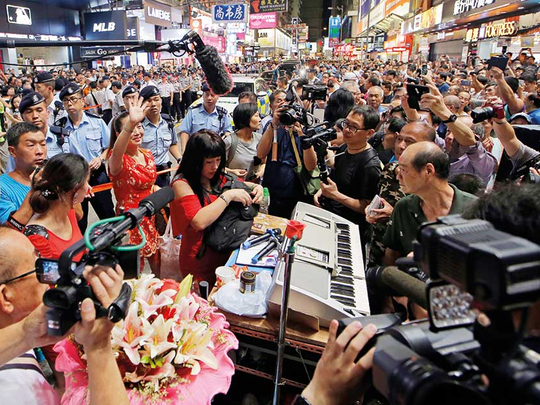
Hong Kong: For people-watching in Hong Kong, few places beat Mong Kok and its pedestrian zones.
Among the slow-moving masses of people on a recent Saturday were buskers of varying age and musical ability, karaoke singers both in tune and off key, acrobats, dancers, magicians and human statues, many of them drawing large crowds.
This weekend will be their final show — at least in one spot.
For almost 20 years, the four-block pedestrian zone on Sai Yeung Choi Street South has been a fixture of Mong Kok, a neighbourhood with working-class roots and a history of political protest that is one of the most crowded in the world. But the government has agreed to close the pedestrian zone after criticism that street performers have made it too loud.
The pedestrian zone was closed to traffic six nights a week when it opened in 2000 in an effort to encourage shopping. After complaints about noise and safety, its hours were first reduced and then restricted to Saturdays and public holidays.
That was still too much for local residents and business owners, who filed more than 1,200 noise complaints last year alone. The cacophony generated by performers trying to drown each other out with amplifiers can reach more than 100 decibels, a survey found, about as much noise as a jackhammer makes. (The World Health Organisation advises against prolonged exposure to noise above 85 decibels.)
The noise complaints led to a near-unanimous vote by the district council in May to permanently abolish the pedestrian zone. It will fully reopen to vehicles on August 4.
Most people are cheering the decision, relieved to finally have some peace and quiet. A government survey of the neighbourhood found it was supported by 97 per cent of respondents.
“It’s so noisy. It’s better to shut the street down. It’s a nuisance,” said Liu, who owns a small noodle shop in the pedestrian zone and would be identified only by his last name. “It’s fine if they can sing well, but they don’t sing well. It’s torture.”
But the street has also brought countless hours of enjoyment and leisure, making the neighbourhood more vibrant.
“It’s not good,” Yu Tohin said of the street’s imminent closure. “There’ll be less entertainment.”
Yu, an elderly resident of an old building a block from the pedestrian area, said that although he could often hear the noise from his apartment, he was not bothered by it. But he did acknowledge that friends who lived directly above the pedestrian street were happy to see it close.
Some performers were nonchalant about losing their musical stage, saying they would just go elsewhere in the city, like the bustling harborside promenade in Tsim Sha Tsui that is popular with tourists.
Others lamented the loss of an iconic cultural space.
“It’s a pity,” said Wendy Lai, a professional singer who had just performed “Stand by Me” to a sizeable crowd. Audience members waved neon light sabres to the beat of the music, and some pressed cash into her hand as she sang.
“Look at how many people there are here, watching,” she said.
The pedestrian zone has bolstered the careers of Hong Kong musicians like boy band C AllStar and Lung Siu-kwan, who went from being a teacher to a professional singer after she started performing in a mask and costume back in 2012, when the city’s busking scene was still in its nascency.
“Street performances can represent the local culture,” Lung said. “It is in some ways pitiful that the zone will no longer be available. It has given me a lot, but it also requires control.”
She suggested that the government issue permits to street performers, as is done in Japan and Taiwan, and set up designated areas for them while ensuring that noise levels are properly regulated.
Lai agreed.
“By issuing permits, you have regulations,” she said. “And only with regulations do you have quality.”












